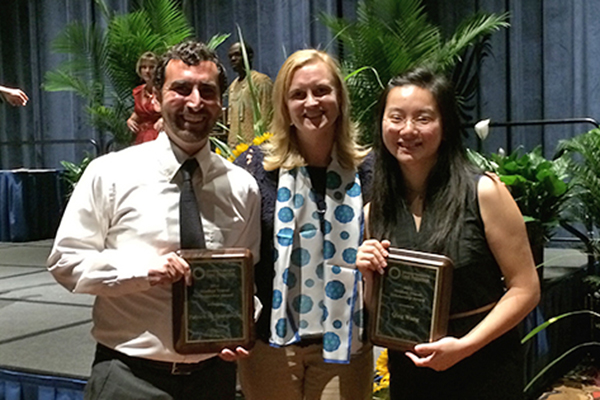
Food safety students
UD students honored by International Association for Food Protection
2:01 p.m., Sept. 2, 2014--University of Delaware doctoral students Patrick Spanninger and Qing Wang were among 16 students from around the world who received travel awards from the International Association for Food Protection (IAFP) to attend the organization’s annual meeting held Aug. 3-6 in Indianapolis.
The conference brought together more than 2,800 of the top industry, academic and government food safety professionals from six continents.
Honors Stories
National Medal of Science
Warren Award
Spanninger and Wang, both in the Department of Animal and Food Sciences in UD’s College of Agriculture and Natural Resources, said that one of the most beneficial aspects of the conference was the networking, as both were paired with mentors from the food industry.
The mentors shared valuable work experiences with the students, who had an opportunity to follow their mentors and learn about their careers in the industry.
Spanninger’s mentor was Ed Wellmeyer, vice president of quality assurance and food safety at Ventura Foods, a leading manufacturer of products such as custom and branded dressings, sauces, mayonnaise varieties and margarines.
“He was an awesome guy,” Spanninger said. “He introduced me to everybody and took me to all of his meetings, and really took me under his wing. I wouldn’t have gotten half the business cards if I hadn’t been with him.”
Wang’s mentor was Michele Gorman, senior manager of food safety and microbiology for the yogurt company Chobani.
“My mentor had lots of working experience in food microbiology and she shared with me her work experience and also introduced her friends to me, so I felt like it was really good to have a mentor there,” said Wang. “I felt like it gave me a better understanding of the industry to help better my future career.”
Conference activities
In addition to providing mentors, the conference also featured talks, presentations and roundtable discussions.
“You can learn a lot during the talks and I went to several that were related to my studies. I also went to several that were just interesting, so it was pretty cool,” said Wang.
Both students presented their research at the conference. Spanninger’s dealt with his laboratory study on evaluating survival of pathogenic bacteria within different types of wildlife manure to assess the possible transmission of E. coli and Salmonella.
Spanninger said provisions of the new Food Safety Modernization Act includes information on reducing risk from animal intrusion and learning more about how pathogens survive in wildlife feces is an important aspect of this.
Wang’s study focused on the inactivation of foodborne viruses in alfalfa seeds by aqueous ozone. This was done by measuring the efficacy of aqueous ozone to disinfect alfalfa seeds contaminated with norovirus and norovirus surrogates.
Wang focused on alfalfa sprouts because they have been associated with a number of foodborne outbreaks where seed contamination was identified as the source.
Kali Kniel, professor in the Department of Animal and Food Sciences who accompanied the students to the conference along with numerous fellow faculty members from the department, said that it is an exciting time for students like Spanninger and Wang to be studying food safety issues pertinent to pre-harvest food safety.
“We are at the intersection of changes that were 70 years in the making. The FDA proposed produce rules will impact growers across the country and in order for the FDA to have the best science on which to base these rules, young developing scientists like Pat and Qing are involved in identifying that science,” said Kniel. “Both students presented work that is important to understanding the variable risks that affect fresh produce growing in fields and also alfalfa sprouts, which have a long history of transmission of foodborne illness.”
Article by Adam Thomas
Photo courtesy of Patrick Spanninger








